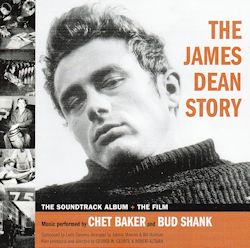
BUY NOW AmazonUK AmazonUS |
CHET BAKER AND BUD SHANK
The James Dean Story (CD + DVD)
|
Soundtrack : The James Dean Story
Jimmy's Theme
The Search
Lost Love
People
The Movie Star
Fairmount, Indiana
Rebel At Work
Success – And Then What?
Let Me Be Loved
Hollywood
Let Me Be Loved [ Vocal version]
Chet Baker - Trumpet, vocals (track 11)
Bud Shank - Alto sax, flute
Don Fagerquist, Ray Linn - Trumpet (tracks 1, 2, 4, 5, 7-11)
Milt Bernhart - Trombone (tracks 1, 2, 4, 5, 7-11)
Charlie Mariano, Herbie Stewart - Alto sax (tracks 1, 2, 4, 5, 7-11)
Bill Holman - Tenor sax (tracks 1, 2, 4-11)
Richie Kamuca - Tenor sax (tracks 1, 2, 4, 5, 7-11)
Pepper Adams - Baritone sax (tracks 1, 2, 4, 5, 7-11)
Claude Williamson - Piano
Monty Budwig - Bass
Mel Lewis - Drums
Mike Paceco - Bongos (tracks 1, 2, 4, 5, 7-11)
Soundtrack : Private Hell 36
Private Hell 36
Havana Interlude
Easy Mood
Daddy, Long Legs
Joshua
Didn't You Know?
Lilli
Dance Of The Lilliputian
Private Blues
Pete Candoli, Charles Giffard, Carlton McBeath, Shorty Rogers - Trumpet
Bob Enevoldsen, Milt Bernhart, Harry Betts - Trombone
George Roberts - Bass trombone
John Graas - French horn
Paul Sarmento - Tuba
Sal Franzella - Alto sax, clarinet
Lennie Niehaus - Alto sax
Bob Cooper, Jimmy Giuffre - Tenor sax
Bob Gordon - Baritone sax, bass clarinet
Bud Shank - Bass sax
Claude Williamson - Piano
Joe Mondragon - Bass
Shelly Manne - Drums
Ida Lupino - Piano, vocal (track 17)
Leith Stevens - Arranger, conductor
The links between jazz musicians based on the West Coast of America and Hollywood were especially strong during the 1950s. The proximity of the film studios meant extra opportunities for employment. The CD under review here is a case in point. Two years after the death of the iconic young actor James Dean in a car crash, at the age of only 24, a documentary entitled The James Dean Story was released. Robert Altman and George W. George shared the directing honours. The film used black and white photographs, interviews with those who knew him, and clips from the film East Of Eden, to tell Dean's story. The music for the movie was composed and conducted by Leith Stevens, who wrote themes for radio and television shows, as well as films, over a career that spanned well over thirty years until his death in 1970. Packaged with a DVD of The James Dean Story, where, of course, the music can be heard in context, is this jazz recording of Theme Music From “The James Dean Story” released originally by World Pacific Records. The arrangements are by Bill Holman and Johnny Mandel and a whole cohort of West Coast musicians take part. In addition, there are nine bonus tracks featuring Leith Stevens' score for another film, Private Hell 36, played by a further group of LA-based alumni, mostly different from those in the first line-up.
The good news for those who enjoy the gently swinging music habitually associated with California at that time (though the jazz scene there was always more complex than orthodoxy suggests) is that this disc hits the spot. Take, for instance, Success - And Then What? What begins in melancholy mode becomes more expansive as Chet Baker skates along with accomplished ease with Shank on alto an ideal foil. Hollywood, aptly enough, is a classic piece of West Coast improv. Claude Williamson on piano was always a pleasure to hear and Shank on alto proves consistently reliable. There are two versions of the ballad, Let Me Be Loved, included. One is purely instrumental, the other with a Baker vocal which was not on the original disc. The song, sung by a pop star of the time, Tommy Sands, on the film soundtrack is a Jay Livingston/Ray Evans composition. It's the only piece of music not to have been written by Leith Stevens. The Chet Baker version on this CD is briefer but more effective than the instrumental version which precedes it. Chet's relaxed vocal style wins the day. Incidentally, this vocal was not on the original album. Bud Shank's wistful, ethereal flute playing can be heard on tracks such as Lost Love and the elegaic Fairmont, Indiana. It is Shank's alto that stands out, however. The Search, for instance, has him really in the groove. I liked The Movie Star, too, for the way the group as a whole cohere. It is difficult to fault Chet's performance on any of these tracks.
The remaining numbers, from the soundtrack of the Don Siegel directed film noir, Private Hell 36, are less appealing overall than what has gone before. Nevertheless, the atmospheric Havana Interlude, the Ellington-esque Easy Mood, the brisk Daddy, Long Legs and the swinging Joshua provide opportunities to savour the work of Pete Candoli, Jimmy Giuffre, Bob Cooper, Milt Bernhart et al. As for the accompanying DVD of The James Dean Story, it seems now very much a product of its time. It is, however, visually interesting, in particular the black and white stills. I found the narrative risible at times, though, and the interviews, for the most part, static and boring. I suspect that the Anton Corbijn film Life released in 2015 will better serve the needs of those who, today, are intrigued by the Dean legend.
The fact that the documentary as a DVD is packaged with the jazz CD of the themes from the soundtrack does give a chance to see how the music is used in the first instance to enhance the film. But, if you are buying the said package, it will be because of the quality and reputation of the West Coast jazz musicians who can be heard in full flow on the album.
James Poore